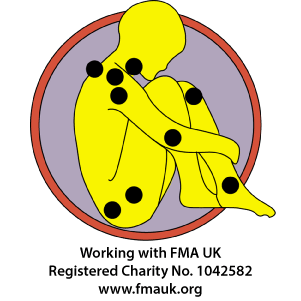 | Home |
| Join Us |
| What Is ME/CFS? |
| Future Meetings |
| ME Clinic News |
| Newsletter Articles |
| Children and Young People |
| Helpful Contacts |
| Our Yoga Classes |
| Our Leaflets |
| Contact Us |
| Registered Charity Number 1161356 |
 |
 |
 |
 |

About ME/CFS
What is it? Symptoms Who can be affected? Causes How long does it last? Treatment Who can help?
ME/CFS - What it is and who can help
What is ME/CFS?
ME (Myalgic Encephalomyelitis) is a chronic illness that affects many body systems and their functions. The formal term used currently by the medical profession is Chronic Fatigue Syndrome (CFS). The changes seem particularly to affect the nervous system and immune system, but they also affect other body systems. The illness can cause profound exhaustion, muscle pain, problems with mental function such as memory loss and poor concentration, malaise and other symptoms. There are an estiated 250,000 people in the UK who suffer from ME/CFS.
What are the Symptoms of ME/CFS?
Symptoms vary from person to person but the most common features are:
· Profound, lasting fatigue, which is not eased by rest
· A general feeling of being unwell which increases after normal physical or mental activity
· Painful or aching muscles &/or joints
· Persistent headaches / migraines
· Problems related to thinking - reduced attention span, inability to plan and organise thoughts, loss of powers of concentration.
· Sleep disturbance - unrefreshing sleep, not enough sleep or too much sleep
· Other nervous system symptoms - poor temperature control (feeling too hot or too cold), increased sensitivity to light & sound
· Recurrent sore throat & enlarged glands
· Digestive disturbances
· Intolerance's and increased sensitivity to alcohol, some foods, some medications, other substances
¢ Autonomic dysfunction-problems regulating blood pressure & heart rate
Do not panic at the length of the list these are only possible symptoms and it does not follow that a person will suffer from all of them.
Who does ME/CFS affect?
M.E. can affect men, women and children of all ages and backgrounds. It is estimated that there are over 250,000 people in the UK with M.E.; nearly two thirds of them are female. Most people develop the illness between their early twenties and mid-forties. However M.E. does affect children and young people, generally those between the ages of 13 to 15 but sometimes children as young as 5.
What causes ME/CFS?
The cause of ME/CFS is not yet fully understood. Abnormalities have been found in the immune system and nervous system, including the functioning of the hypothalamus (a part of the brain that regulates basic functions like appetite, sleep and temperature control). More research is needed to understand the exact role of disruptions in these and other systems.
Some evidence exists on the factors that may make people more prone to developing ME/CFS (predisposing factors), and there is good evidence of factors that can trigger and maintain the illness. It is generally thought that an interplay of these factors contributes to the development of ME/CFS
Predisposing Factors:
· Gender - ME/CFS is more common in women than in men
· Genetics - ME/CFS may be more common in certain families
Triggering Factors:
· Infections
· Immunisations
· Life events
· Physical injury
· Environmental toxins
Maintaining Factors:
· Sleep difficulties
· Over activity
· Inactivity
· Mood disorders
How long does ME/CFS last?
ME/CFS can last anywhere between a few months and many years.
· 20% of people are likely to make a full recovery (this will usually occur within 2-4 years)
· Around 60% of people make a significant recovery, including sufferers who have been severely disabled at some point
· Unfortunately up to 20% of people remain chronically disabled
Is there a treatment for ME/CFS?
Unfortunately there is currently no known cure for ME/CFS The limited understanding of the mechanisms underlying the illness adds to the problems of finding a effective treatment, and more research is required. You may hear of 'miracle cures' in the national press, but in our experience these have met with mixed reactions. However, do not worry there is still plenty that can be done to help sufferers lead better lives.
· Early diagnosis and advice on managing the illness can help with long term recovery
· Adequate support & understanding from family, friends, the community, and Local/National Government services
· Sufferers most learn to live within their energy levels, and carefully pace their activities. This means discovering their limitations and learning what degree of activity their bodies will tolerate without causing a relapse
· Doctors can work with sufferers to tackle some aspects of ME/CFS on a symptom-by-symptom basis.
Who can help?
The Bury and Bolton ME/CFS Support Group is run by a small group of dedicated people, sufferers & carers alike, who provide help to those suffering with ME/CFS. A small donation allows members to attend regular group meetings with guest speakers, receive newsletters, access to our private Facebook group, advice on welfare/benefits and access to other group facilities. Membership often extends beyond the immediate catchment area, as any person with ME/CFS or their carer is readily welcomed.
In addition to the above we campaign for heightened understanding of the seriousness of ME/CFS, as well as improved statutory services for people in areas such as the NHS.
It can be so useful to meet and talk to other members, both in person and on our private Facebook group, because they will undoubtedly have experienced much of what newly diagnosed people are going through (from problems at work and accessing welfare, to symptom management, to talking to your doctor), and be able to offer mutual support and advice.
We welcome anyone with Fibromyalgia. We are working with The Fibromyalgia Association (FMA UK). Registered Charity 1042582
Please contact us if you have any questions about joining.
